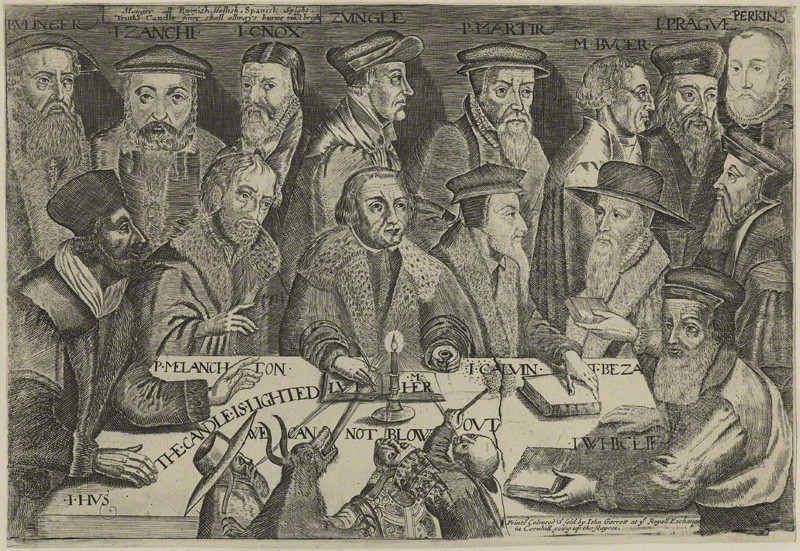 Calvinism is a branch of Protestantism that was founded by the French theologian John Calvin in the 16th century. It is named after its founder and is also known as Reformed theology.
Calvinism is based on the principles of predestination, meaning that God has predetermined who will be saved and who will not, and total depravity, meaning that all people are inherently sinful and cannot save themselves.
Calvinists believe that salvation is received solely through God’s grace and not through good works. They also emphasize the sovereignty of God, meaning that God is in control of all things and that everything that happens is part of his divine plan.
Calvinism has had a significant impact on Western culture and has been an important influence on the development of other Protestant denominations, including Presbyterianism.
In terms of worship, Calvinism stresses the importance of the preaching of the word of God, and the use of the sacraments, such as baptism and the Lord’s Supper, as signs of God’s grace and means of strengthening the believer’s faith.
In conclusion, Calvinism is a branch of Protestantism that was founded by John Calvin in the 16th century. It is based on the principles of predestination and total depravity, and emphasizes the sovereignty of God and the importance of God’s grace in salvation. Calvinism has been an important influence on Western culture and has played a significant role in the history of Christianity.
Note: this post is intended to broaden the perspective of all readers and is merely a brief introduction. I encourage you to continue to explore by seeking additional content, attending multicultural events, and through curious conversations with members of this faith.
Links:
Calvinism is a branch of Protestantism that was founded by the French theologian John Calvin in the 16th century. It is named after its founder and is also known as Reformed theology.
Calvinism is based on the principles of predestination, meaning that God has predetermined who will be saved and who will not, and total depravity, meaning that all people are inherently sinful and cannot save themselves.
Calvinists believe that salvation is received solely through God’s grace and not through good works. They also emphasize the sovereignty of God, meaning that God is in control of all things and that everything that happens is part of his divine plan.
Calvinism has had a significant impact on Western culture and has been an important influence on the development of other Protestant denominations, including Presbyterianism.
In terms of worship, Calvinism stresses the importance of the preaching of the word of God, and the use of the sacraments, such as baptism and the Lord’s Supper, as signs of God’s grace and means of strengthening the believer’s faith.
In conclusion, Calvinism is a branch of Protestantism that was founded by John Calvin in the 16th century. It is based on the principles of predestination and total depravity, and emphasizes the sovereignty of God and the importance of God’s grace in salvation. Calvinism has been an important influence on Western culture and has played a significant role in the history of Christianity.
Note: this post is intended to broaden the perspective of all readers and is merely a brief introduction. I encourage you to continue to explore by seeking additional content, attending multicultural events, and through curious conversations with members of this faith.
Links:
 Calvinism is a branch of Protestantism that was founded by the French theologian John Calvin in the 16th century. It is named after its founder and is also known as Reformed theology.
Calvinism is based on the principles of predestination, meaning that God has predetermined who will be saved and who will not, and total depravity, meaning that all people are inherently sinful and cannot save themselves.
Calvinists believe that salvation is received solely through God’s grace and not through good works. They also emphasize the sovereignty of God, meaning that God is in control of all things and that everything that happens is part of his divine plan.
Calvinism has had a significant impact on Western culture and has been an important influence on the development of other Protestant denominations, including Presbyterianism.
In terms of worship, Calvinism stresses the importance of the preaching of the word of God, and the use of the sacraments, such as baptism and the Lord’s Supper, as signs of God’s grace and means of strengthening the believer’s faith.
In conclusion, Calvinism is a branch of Protestantism that was founded by John Calvin in the 16th century. It is based on the principles of predestination and total depravity, and emphasizes the sovereignty of God and the importance of God’s grace in salvation. Calvinism has been an important influence on Western culture and has played a significant role in the history of Christianity.
Note: this post is intended to broaden the perspective of all readers and is merely a brief introduction. I encourage you to continue to explore by seeking additional content, attending multicultural events, and through curious conversations with members of this faith.
Links:
Calvinism is a branch of Protestantism that was founded by the French theologian John Calvin in the 16th century. It is named after its founder and is also known as Reformed theology.
Calvinism is based on the principles of predestination, meaning that God has predetermined who will be saved and who will not, and total depravity, meaning that all people are inherently sinful and cannot save themselves.
Calvinists believe that salvation is received solely through God’s grace and not through good works. They also emphasize the sovereignty of God, meaning that God is in control of all things and that everything that happens is part of his divine plan.
Calvinism has had a significant impact on Western culture and has been an important influence on the development of other Protestant denominations, including Presbyterianism.
In terms of worship, Calvinism stresses the importance of the preaching of the word of God, and the use of the sacraments, such as baptism and the Lord’s Supper, as signs of God’s grace and means of strengthening the believer’s faith.
In conclusion, Calvinism is a branch of Protestantism that was founded by John Calvin in the 16th century. It is based on the principles of predestination and total depravity, and emphasizes the sovereignty of God and the importance of God’s grace in salvation. Calvinism has been an important influence on Western culture and has played a significant role in the history of Christianity.
Note: this post is intended to broaden the perspective of all readers and is merely a brief introduction. I encourage you to continue to explore by seeking additional content, attending multicultural events, and through curious conversations with members of this faith.
Links:

